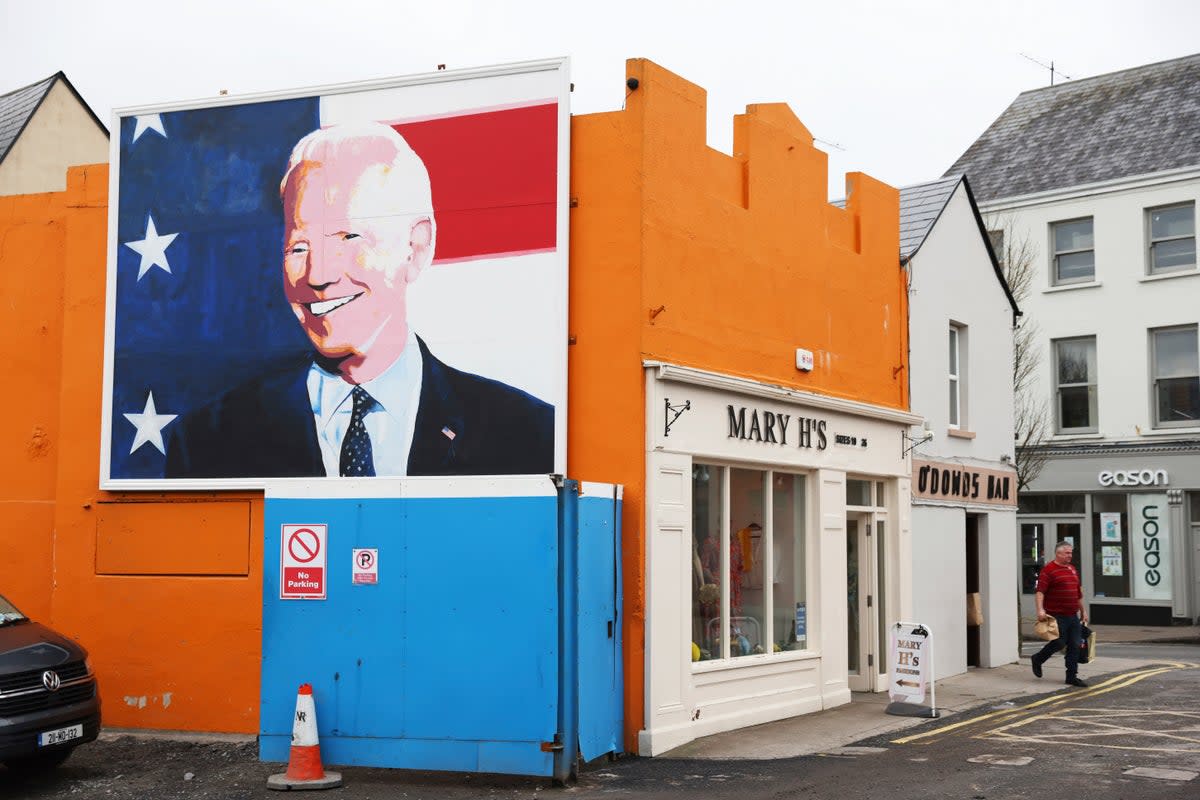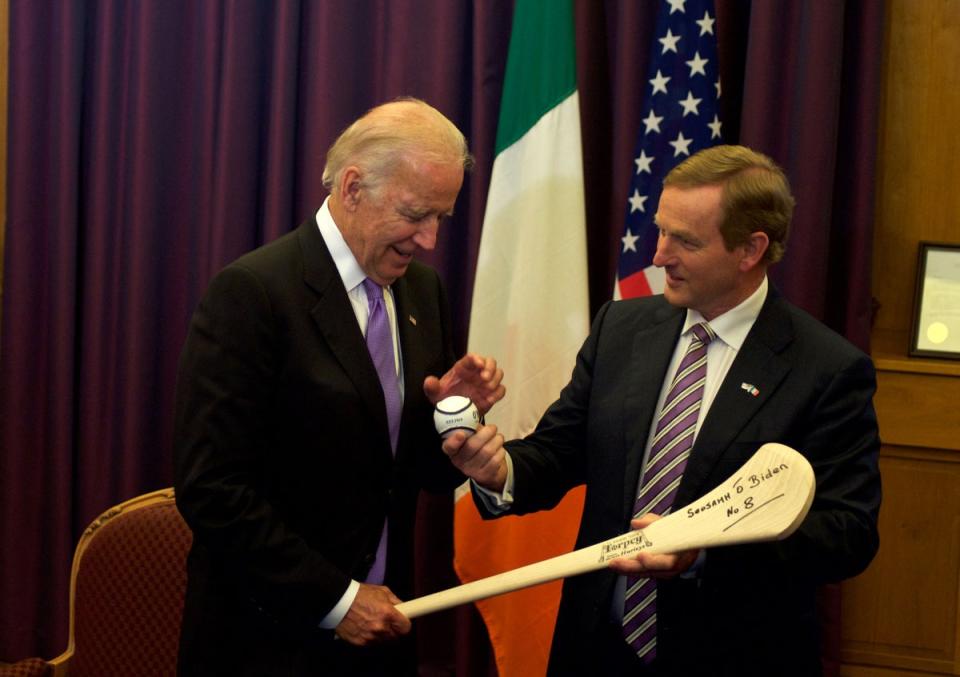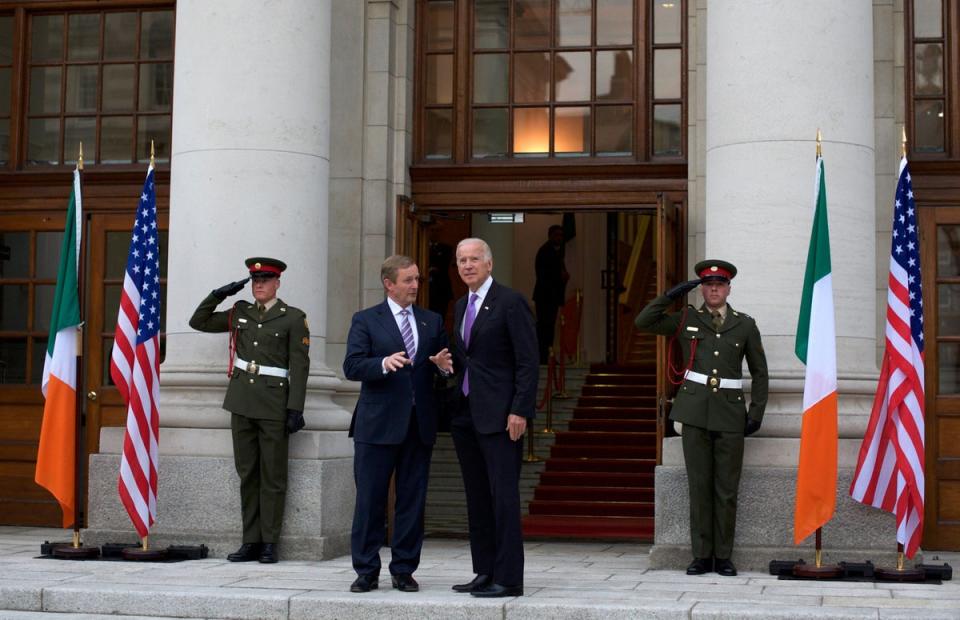Biden set to revisit Irish roots after marking Good Friday Agreement anniversary

- Oops!Something went wrong.Please try again later.
- Oops!Something went wrong.Please try again later.
When US television networks finally declared Joe Biden the winner of the 2020 election, the BBC broadcast a compilation of clips from Mr Biden’s long political career, including his aborted presidential runs in 1987 and 2008, and his eight years as vice president during the Obama administration.
Of that pastiche of videos spanning multiple decades, one short clip set the internet ablaze: a years-old exchange with Nick Bryant, one of the British broadcaster’s New York-based correspondents.
When Bryant asked Mr Biden if he could offer a “quick word for the BBC,” Mr Biden quickly replied: “The BBC? No thanks — I’m Irish!”
The 46th President is not the first Irishman to hold America’s highest office. He’s not even the first Irish-Catholic to do so. But in the 21st century, when the white ethnic enclaves and rivalries that once played a huge role in America’s political and civic life have largely gone dormant in favour of a far more homogenised culture, he remains intensely proud of his ancestral roots in the Republic of Ireland and has made references to his heritage a touchstone of his rhetorical style.
In his 2017 memoir, Promise Me, Dad, Mr Biden recounted an anecdote he often uses on the stump, in which he recalls his grandfather urging him to “keep the faith”.
In his public remarks, he often recalls his grandmother’s reply, in which she counters that he should “spread the faith” as well. But in his book, Mr Biden noted that his grandfather also told him: “Remember the best drop of blood in you is Irish”.
Mr Biden’s Irish roots run deep
According to Irish Family History Centre director Fiona Fitzsimmons, there’s far more than a drop of Irish blood flowing through Mr Biden’s veins.
She told USA Today that of Mr Biden’s 16 great-grandparents, 10 of them were from Ireland. And while multiple US presidents — including Andrew Jackson, John F Kennedy, Ronald Reagan, and Barack Obama — have traced at least some of their roots to the same island, the genealogist called the 46th US chief executive, whose family roots hail from County Derry and County Louth on the island’s east coast, “probably … the most Irish of all the presidents”.
This week, that “most Irish” American president is set to make his first pilgrimage to his family’s homeland since assuming office in 2021, with a planned four-day visit to Northern Ireland and Ireland. He last visited Ireland in 2017, a year after he made an official visit as Vice President during the Obama administration.

He’ll depart the White House on Tuesday morning and will land in Belfast that evening. On Wednesday, he and UK Prime Minister Rishi Sunak will mark the 25th anniversary of the Good Friday Agreement that ended decades of sectarian violence in Northern Ireland. He’ll then cross the border into Ireland for a three-day stay, including trips to the areas where his ancestors lived before emigrating to the US.
Because the Democratic Unionist Party’s boycott of the power-sharing government established under the Good Friday agreement remains in effect due to the ongoing dispute over customs checks between Northern Ireland and the rest of the UK, Mr Biden will not be able to address that devolved legislature.
Instead, he will deliver remarks to mark the quarter-century anniversary of the peace accords at Ulster University.
National Security Council spokesperson John Kirby said on Monday that the president’s speech in Belfast would mark “the tremendous progress since the signing of the Belfast Good Friday agreement 25 years ago” and “ underscore the readiness of the United States to preserve those gains and support Northern Ireland's vast economic potential to the benefit of all communities”.
Mr Kirby said the president will also address a joint session of the Irish parliament in Dublin, where he will speak about “US-Irish cooperation to advance democracy, peace, security and prosperity” and the “shared deep history between the United States and Ireland”.
“Today, one in 10 Americans claim Irish ancestry and Irish Americans are proudly represented in every facet of American life. Ireland is a key economic partner of the United States and the United States and Ireland are working closely together to make the global economy more fair,” he said.
He added that Ireland “has also been a key partner for 21st century challenges” including through providing support for Ukraine, such as “vital nonlethal assistance including medical supplies, body armor, and support for Ukraine's electric grid, as well as their agriculture” and welcoming nearly 80,000 Ukrainian refugees since Russia invaded last year.
Mr Biden’s visit also comes just days after the Belfast Telegraph reported that the Northern Ireland police services foiled a plot by the New Irish Republican Army — a republican paramilitary group that considers itself the successor of the infamous group that disarmed after the 1998 peace accords — to set off a bomb in Derry during the president’s visit there.
Mr Kirby also said the president will attend a banquet at Dublin Castle and will make stops in County Mayo, including a visit to the North Mayo heritage and genealogical centre’s family history research unit, as well as a speech at St Murdoch’s Cathedral, where Mr Kirby noted that the president’s great-great-great grandfather sold 27,000 bricks for its constuction in 1827 — a transaction that would help pay for passage for him and his family to America more than two decades later.
“The President is very much looking forward to that trip ... and to celebrating the deep historic ties that our two countries and our two peoples continue to share,” he said.
A president who wears Ireland on his sleeve
Mr Biden’s constant touting of his Irish roots has been a constantly recurring theme in his political oratory dating back to his decades-long career as a US Senator from Delaware.
On the campaign trail and since becoming president, he often speaks of his great-great-great grandfather, Edward Blewitt, who left Ireland for the US in the 19th century during the Irish potato famine and later settled in Mr Biden’s birthplace of Scranton, Pennsylvania. He also invokes his great-great grandfather, Owen Finnegan, who emigrated to the US from Ireland during the same period.
The president peppers his public remarks, both prepared and off-the-cuff, with invocations of his Irish heritage, and sometimes alludes to negative stereotypes in a humorous way.
During one question-and-answer session with reporters, he responded to a query about tensions between the White House and West Virginia Senator Joe Manchin over Mr Biden’s Build Back Better domestic programme by claiming that “some people” think he’s “not Irish” because he didn’t hold a grudge against the conservative Democrat for stalling the legislation.
At a St Patick’s Day event last month alongside a fellow Irish-American, House Speaker Kevin McCarthy, the president quipped that his Irish heritage may be in question because he doesn’t have relatives in jail and is a teetotaler.
“I’m the only Irishman you ever met, though, that’s never had a drink, so I’m OK. I’m really not Irish,” he said.

The president is also quite fond of quoting Irish poets — including a favourite, the late Nobel laureate Seamus Heaney — and has used references to his ancestry when addressing political matters and various conflicts both at home and abroad.
In January, he referenced his family’s emigration from Ireland to the US during remarks alongside Mexican president Andres Manuel Lopez Obrador as the two leaders discussed strategies for controlling irregular migration along the US-Mexico border.
"All of you know all of us in the United States are immigrants. And mine go all the way back to the Irish famine," he said.
During a speech in Jerusalem last year, the president compared the plight of the Irish under British rule to the Palestinians.
"My family is Irish American, and we have a long history … not fundamentally unlike the Palestinian people with Great Britain and their attitude toward Irish-Catholics over the years, for 400 years,” he said.
And world leaders have in turn recognised Mr Biden’s affinity for his ancestral home, with one — Irish Taoiseach Leo Varadkar — describing him as “unmistakably a son of Ireland” during his traditional St Patrick’s Day visit to the White House last month.
"President Biden, in your life story we see reflected the story of Ireland," he said.

